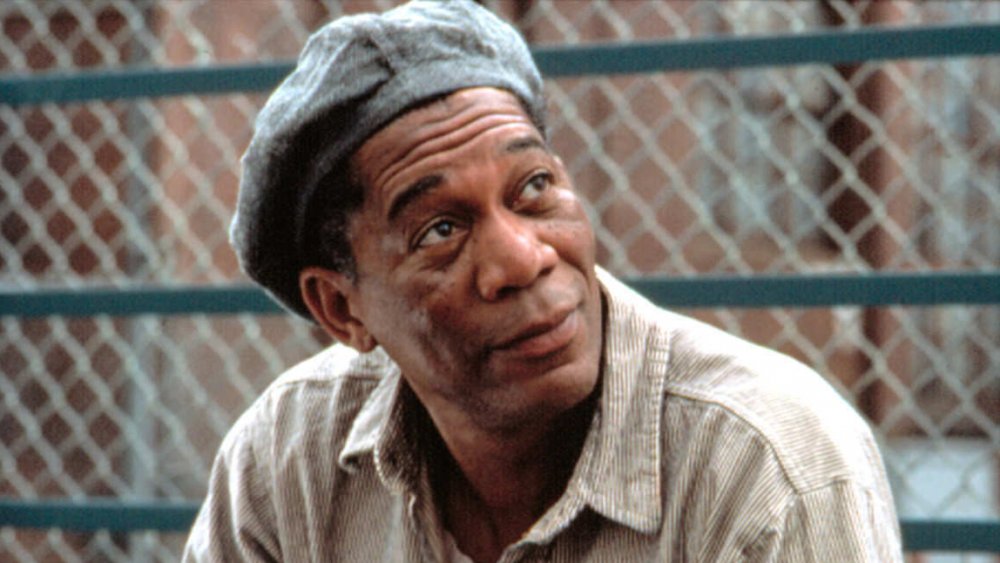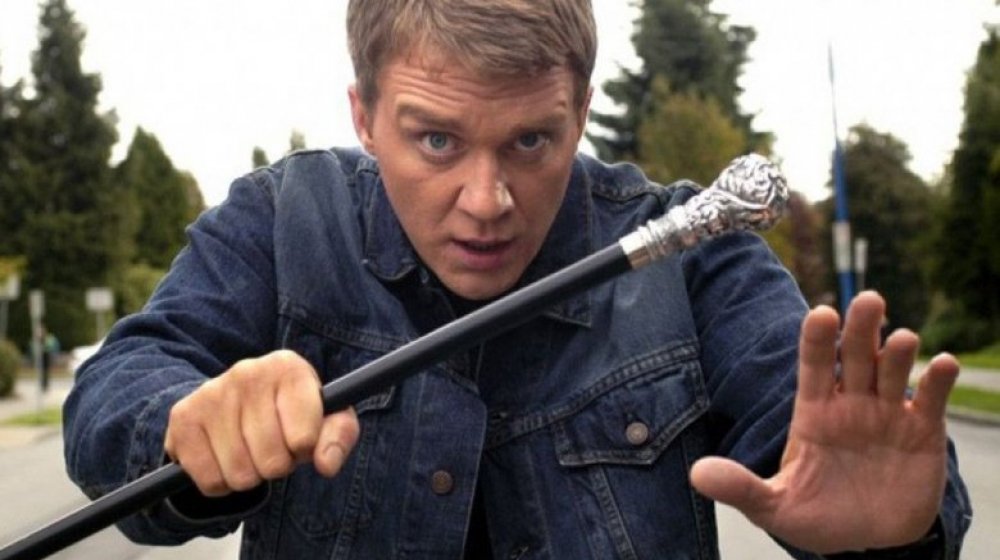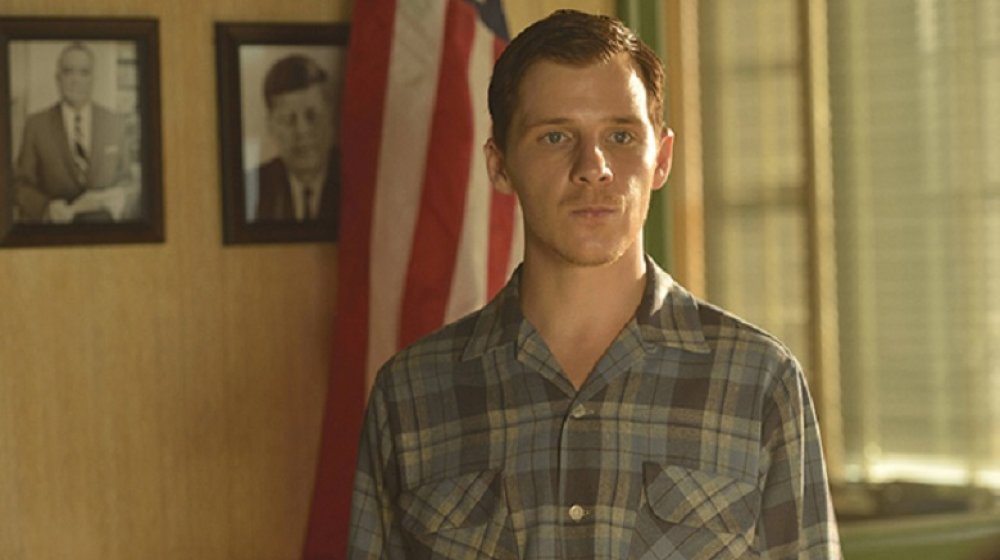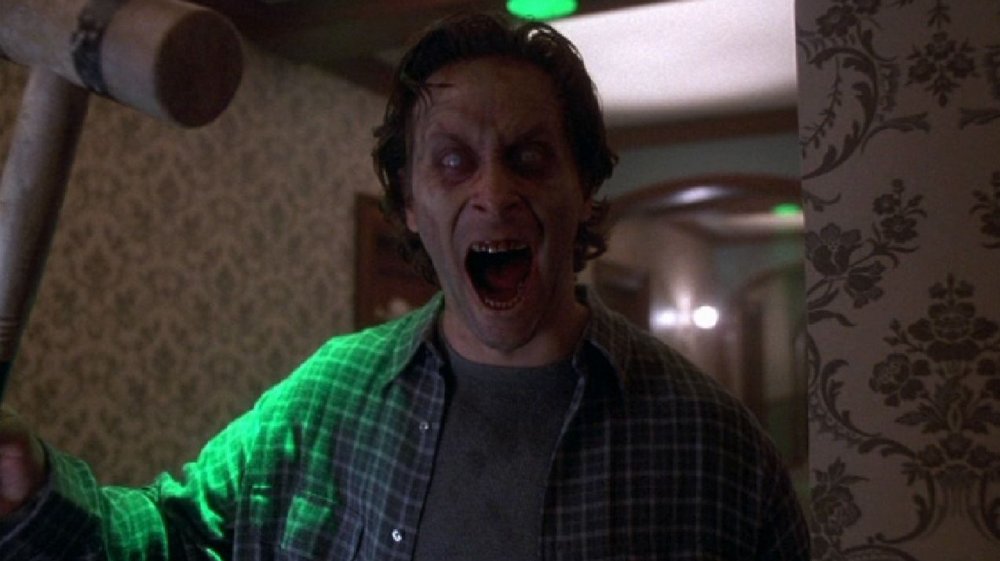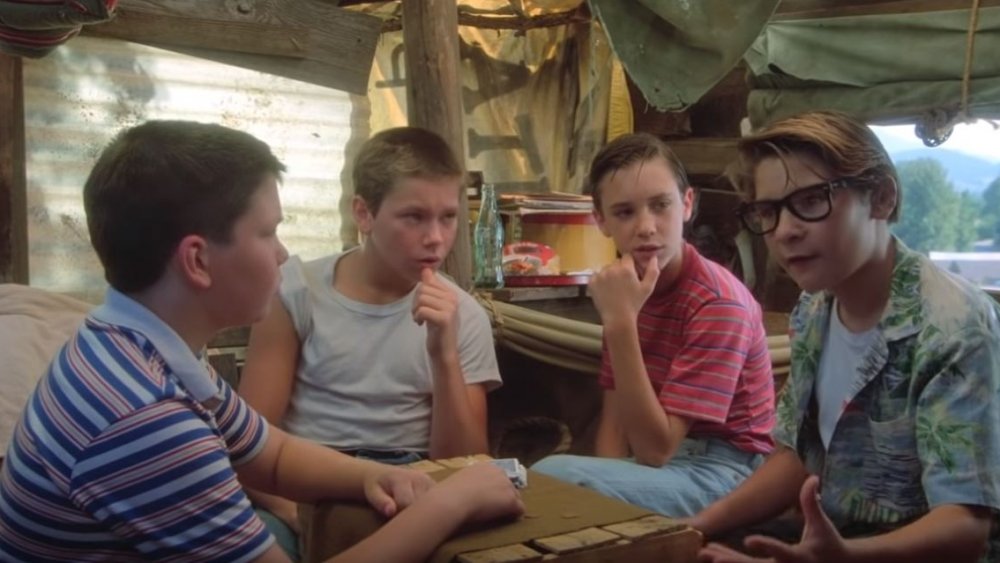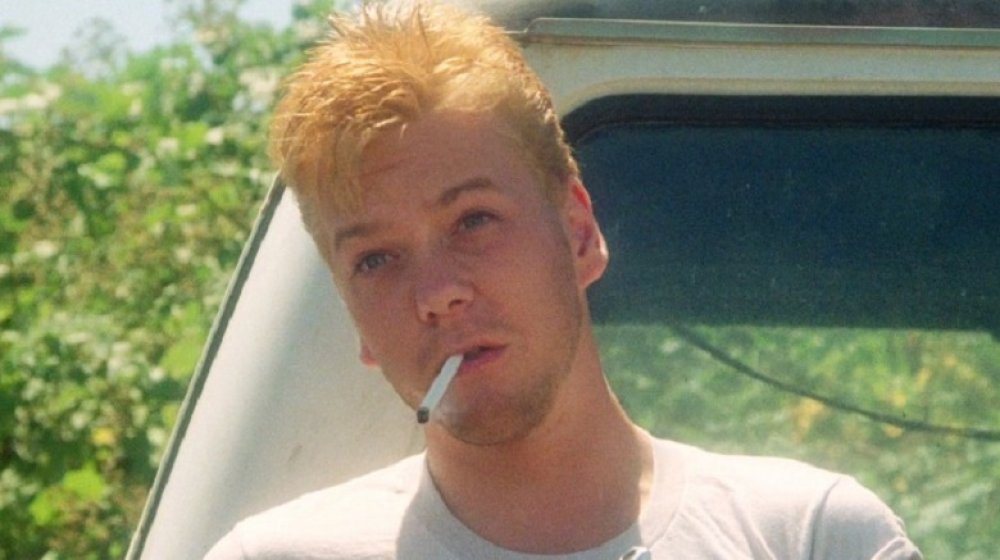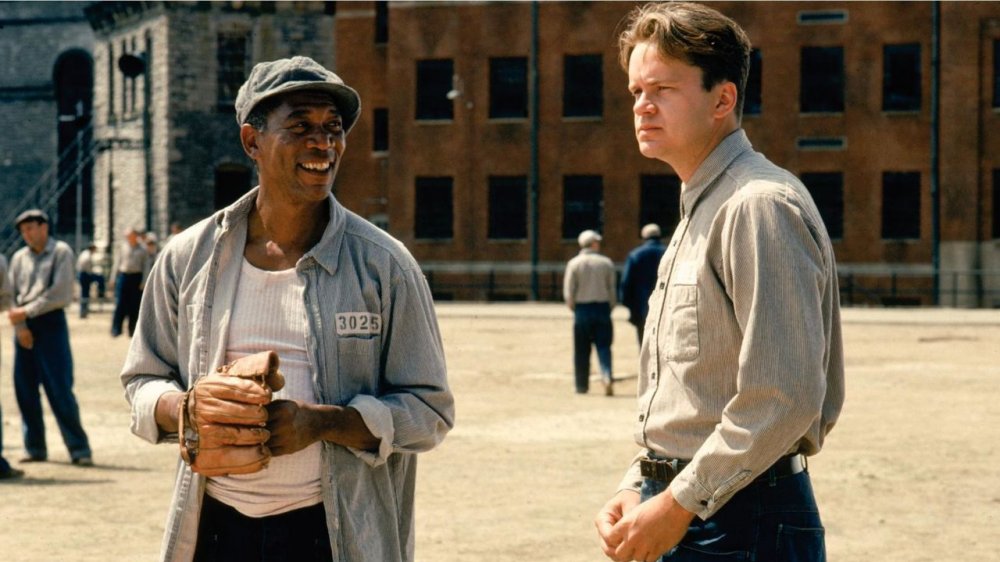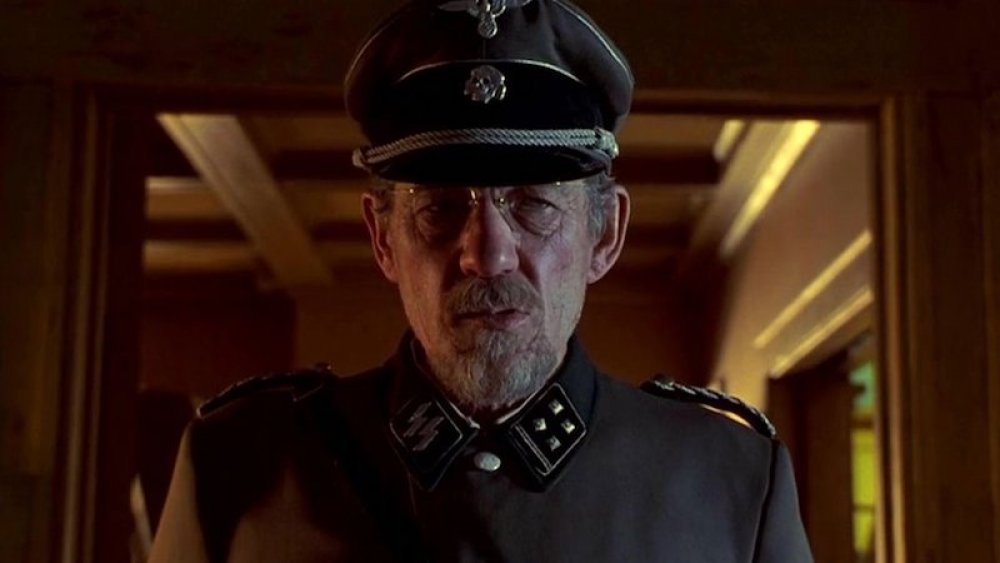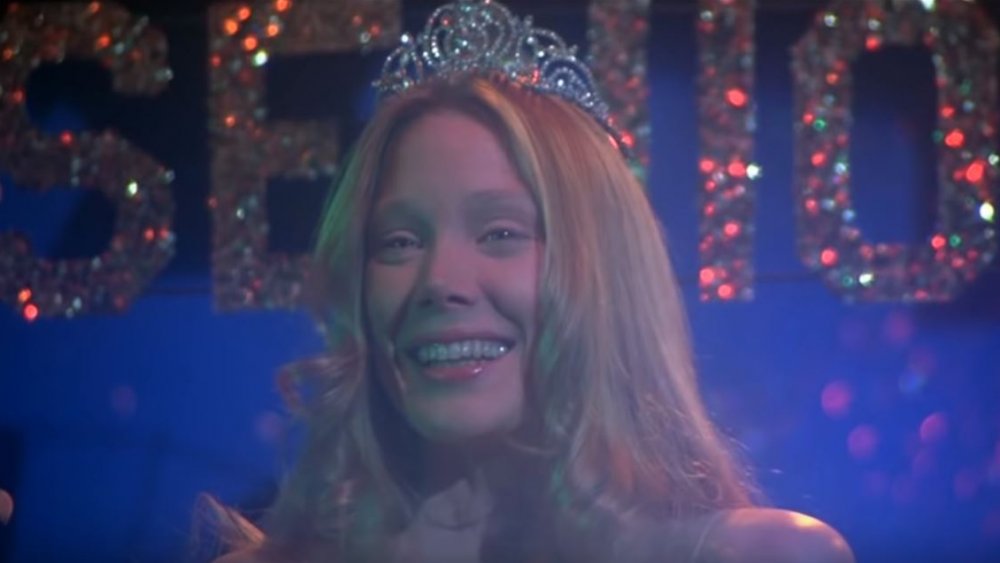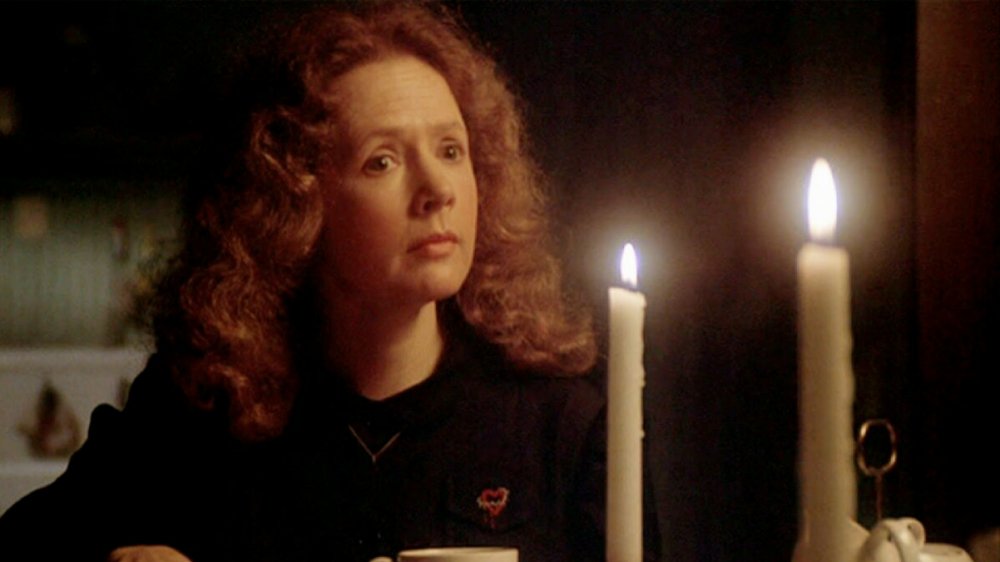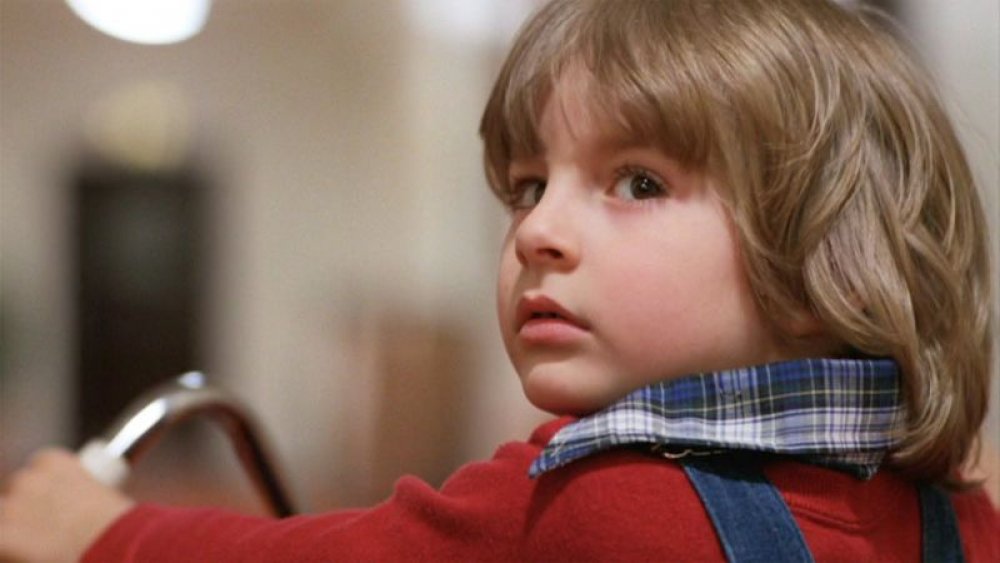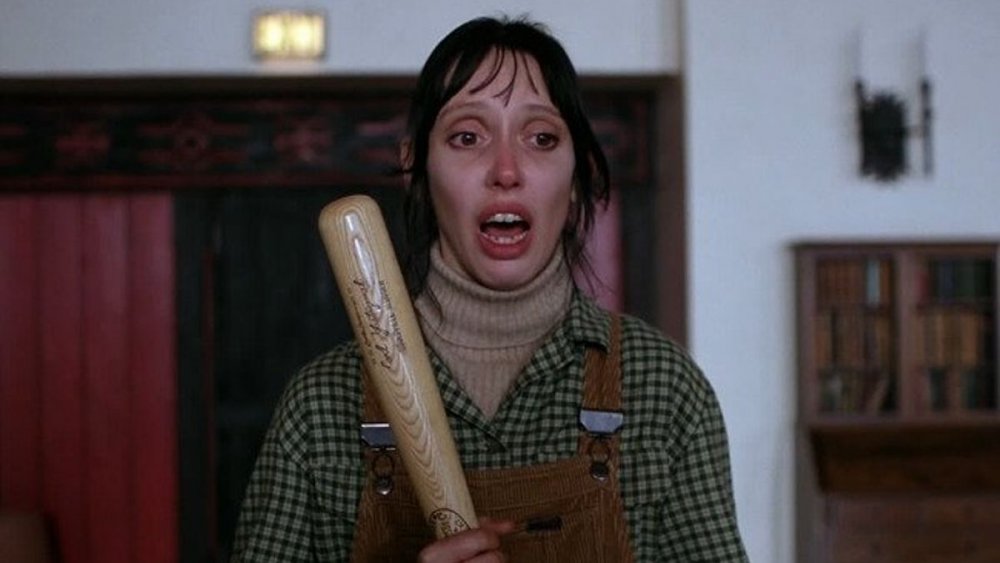Stephen King Roles That Changed Actors Forever
Stephen King properties have been adapted to stage and screen since Carrie hit theaters in 1976. Since then, there have been several dozen movie and TV adaptations, as well as a few tangentially related franchises and original works by King himself. With over 60 books and 200 short stories, there's never going to be any shortage of source material. And as a result, there are plenty of actors who've shown up in Stephen King projects, and for some of those stars, that experience changed their lives.
Whether it's working on a classic King movie or one of his more frowned-upon films, getting involved with the King of Horror can make a star, revive a career, give an actor a new perspective, or offer opportunities. In other words, the bestselling author has done way more than change the literary landscape. He's impacted the lives of several major stars, thanks to his iconic characters. From helpful psychics to horrified housewives, these are the Stephen King roles that changed actors forever.
Anthony Michael Hall's career was revived in The Dead Zone
Anthony Michael Hall was one of the biggest young stars of the 1980s. A regular for teen movie director John Hughes, a veteran of the Vacation franchise, and a brief cast member of Saturday Night Live, his career looked bulletproof. Then he grew up and trended down. But fortunately, a Stephen King role saved him.
Hall's career tapered off in the '90s, and he spent most of it doing guest TV appearances and small movie roles. Hall was at a professional low point in 2002 after starring in the much-maligned Freddy Got Fingered. After that, he managed to snag the lead role in The Dead Zone, based on the King book of the same name and the David Cronenberg movie adaptation. Hall played the part of Johnny Smith, a man who wakes up from a coma with psychic powers, for six seasons. During its run, it was one of the highest-rated shows on basic cable.
After years of misses, Hall had a hit again, and he's credited The Dead Zone with turning around his career. During the show's run, he even showed off new skills by directing an episode.
Daniel Webber came to America for 11.22.63
Daniel Webber is one of many actors who've broken through via a Stephen King project. His turn as Lee Harvey Oswald in Hulu original 11.22.63, based on King's book of the same name, has brought him to the cusp of stardom. The story of a man sent back in time to stop the assassination of John F. Kennedy, the miniseries brought the Australian Webber to a new career in America.
A professional trampolinist turned wind turbine worker turned actor, Webber started acting in 2008. He spent the next few years picking up small movie roles and a major TV part in K-9, a series based on robot companion of the same name from Doctor Who. But he wasn't exactly getting any super star opportunities.
But when Hulu adapted 11.22.63, they decided to cast an unknown actor as Oswald. They figured the audience would have an easier time seeing him embody the role than a big name. Webber heard about the casting, and he did two days of research on Oswald before sending in an audition tape. He made note of Oswald's speech patterns and body language, and the production team was impressed enough to hire him. It was Webber's first role in America and his first role using an American accent. The role won him acclaim and, as such, more acting parts stateside.
Webber parlayed this into roles on two other major streaming properties, this time on Netflix. After 11.22.63, he played PTSD-stricken veteran/bomber Lewis Wilson in The Punisher and Mötley Crüe lead singer Vince Neil in The Dirt.
Stephen King got Steven Weber taken seriously
Stephen King has a famously combative relationship with Stanley Kubrick's adaptation of The Shining. As such, King took it upon himself to make his own version, which took form as a TV miniseries in 1997. The series itself isn't fondly remembered, even though it has its fans. It did, however, help one actor in particular: Steven Weber. Known to most people from his part as a horned-up pilot on sitcom Wings, The Shining helped him get taken a little more seriously as an actor.
Weber had some dramatic parts in the past, including playing John F. Kennedy in the miniseries The Kennedys of Massachusetts and a starring role in Single White Female. By the mid-'90s, however, he was primarily known as a comedy actor from his part on Wings. However, his big dramatic chance came when he took on the role of Jack Torrance in King's personal version of The Shining. The long shadow that Jack Nicholson cast over the role scared other actors away, but Weber came in last minute and impressed the production team.
In the series, Weber plays Jack as more of an "everyman" than Nicholson did, as per King's demands. The author wanted Jack as a normal dude who slowly goes insane instead of someone a little off his rocker from the get-go. And as a result, Variety called the performance Weber's "best dramatic work ever," and The New York Times called Weber "chillingly effective." Afterwards, the actor started picking up more dramatic work, including projects like NCIS: New Orleans, 13 Reasons Why, and the Showtime TV movie Common Ground.
Weber wasn't done with Stephen King roles after this series, either, as he provided the narration for the audiobook of IT.
Stand by Me launched many careers
Not many films can boast a cast like Stand by Me. Fewer films can claim to be the starting point for no less than four successful acting careers. Based on King's novella The Body, Stand by Me tells the story of four boys searching for a dead body in the woods. And the four kids in question were played by new teenage actors Wil Wheaton, Jerry O'Connell, Corey Feldman, and River Phoenix.
As for Wheaton, it was his first major movie role, and he'd join the cast of Star Trek: The Next Generation soon after. He's since gone on to become something of a geek icon, epitomized by playing a version of himself on The Big Bang Theory. It was also O'Connell's first movie role, who'd go on to a solid and varied acting career on stage and screen, with perhaps his most prominent role coming in Sliders.
Corey Feldman was the most established star in Stand by Me, having already appeared in Gremlins and The Goonies, but he continued to be successful the rest of the decade. In fact, he'd go on to become one of the most iconic stars of the '80s, so much so that he'd capitalize on it in reality shows years later.
Finally, there's Phoenix, whose work in the film helped sell it to wary distributors. Coming out of this movie, he was pegged as the "next big thing," with Wheaton saying he was due for a "Tom Hanks career." He acted in several high-profile films — e.g. My Own Private Idaho, Indiana Jones and the Last Crusade, Sneakers — before his tragic death by an overdose at 23.
Kiefer Sutherland learned not to watch his own work
Stand by Me was the biggest movie of Kiefer Sutherland's career up to that point. It was also the film that taught him an important lesson: You can't fairly judge your own work. This means that everyone on planet Earth has seen Sutherland on the silver screen more than he has.
After the film was finished, Sutherland attended a cast and crew screening of Stand by Me with his then-girlfriend. He was upset by his performance, feeling that none of his feelings about the character had appeared up on the screen. He was convinced that his career was over, and that he needed a new job. When his girlfriend said it was great, he responded with, "Don't patronize me."
Of course, Sutherland's doubts were unfounded. The movie went on to become a roaring success, which taught him to never view his own work. To this day, he's never watched a TV show or a movie that he's starred in, because he only sees his faults. He's never even watched an episode of 24, but that was never necessary in the first place. In his own words, "I know how it goes, I have read the script." Well, you can't argue with that.
The Shawshank Redemption was Morgan Freeman's first time narrating
Morgan Freeman the actor is a huge star, but Morgan Freeman the voice is arguably a bigger star. As an actor, his calm but authoritative demeanor has seen him play everyone from school principals to chauffeurs to God himself. As a narrator, he's voiced over everything from Oscar-winning documentaries like March of the Penguins to National Geographic's The Story of God. And this career as a voiceover artist can be traced back to a Stephen King role — inmate Red in The Shawshank Redemption.
Freeman attracted considerable acclaim as an actor before Shawshank, including two Oscar nominations, but Red remains one of his most iconic roles, and Shawshank is probably his most beloved film. Based on King's novella Rita Hayworth and Shawshank Redemption, the 1994 film had Freeman pulling double duty. Not only was he one of the main characters, he was also narrating the entire thing. And sure, Shawshank bombed in theaters, but it picked up a second life on TV and at rental stores, and it's now often listed as one of the best movies of all time.
Freeman has since become just as famous for his voice work as he has for his acting. And it's all thanks to Stephen King, Red, and a box office bomb that became one of the most acclaimed movies of all time.
Ian McKellen became Magneto because of a forgotten Stephen King movie
Apt Pupil, on the rare occasion its remembered at all, isn't remembered fondly. A Bryan Singer project based on the King novella of the same name, it's the story of a high school boy (Brad Renfro) who finds out his neighbor (McKellen) is a Nazi fugitive. The movie was incredibly divisive, and sadly, it was the last major picture of Renfro's promising career before addiction took hold of him. There was also an incident where minors disrobed on set, which is especially troubling in light of certain allegations against Singer.
The lone bright spot were the performances, particularly the one by McKellen, who played Nazi-in-hiding Kurt. McKellen's performance earned praise and, more importantly, it impressed Singer. So when the director was brought on board to direct X-Men, he asked McKellen to play Magneto. Yes, that's right — McKellen followed up playing a Nazi by playing a Holocaust survivor. Already an established actor by any standard, Apt Pupil helped McKellen break into blockbusters.
A Stephen King role launched Sissy Spacek's career
Carrie was the first screen adaptation of a Stephen King property, and it remains one of the most iconic. The film launched several careers, including William Katt's, as he'd go on to star in The Greatest American Hero. John Travolta also appeared in a small role. But the person who owes the most to the movie is Sissy Spacek. The movie almost singlehandedly turned her into a star.
Spacek had already started to carve out an intriguing career for herself, starting as a singer before moving to acting. She first drew attention in Terrence Malick's Badlands but still wasn't quite a star yet. Hearing that Stephen King's Carrie was getting adapted and being familiar with the book, she auditioned for the title role. Director Brian De Palma had another actress in mind, but Spacek's audition was so good that it blew everyone else out of the water.
The role won critical acclaim and nabbed Spacek an Oscar nomination. Spacek is still proud of the film and its place in the horror movie canon. In fact, she still runs into admirers of Carrie today, including one fan who had a tattoo of Carrie at the prom.
Carrie brought Piper Laurie back to cinema
Piper Laurie was once a glamorous Hollywood starlet who played fittingly glamorous roles. Then she left Hollywood behind to work on Broadway, but Carrie brought her back and gave her screen roles for years.
Laurie starred in a series of romance movies throughout the 1950s, acting alongside everyone from Ronald Reagan to Tony Curtis. Towards the end of the decade, she grew tired of roles without substance, and she left Hollywood for New York. She got an Academy Award nomination for The Hustler before working almost exclusively on stage for 15 years.
However, she made her big Hollywood comeback in Carrie as Margaret White, Carrie's religious fanatic mother. The role was unlike anything she'd done on screen before, and it netted her a second Oscar nomination. She found the role "a hoot," and it led to a new world for her. Gone was the tabloid beauty, in was the wicked mother. Playing a matronly villain gave her career a new lease on life, and there's a direct line between Margaret White and Catherine Martell on Twin Peaks.
Dan Lloyd lives a (mostly) normal life post-Shining
Danny Lloyd played Danny in The Shining, but he never did much else on screen. Despite being a focal point of the movie, his acting career dried up almost immediately. He had a brief appearance in a long-forgotten TV movie about G. Gordon Liddy before vanishing from Hollywood. Unlike many child actors, Lloyd didn't crash and burn. He just moved on with his life. But The Shining, in many ways, never left him.
Lloyd tried to stay in acting, but he had a hard time landing parts, so he left the business by high school. Now a biology professor at a community college in Kentucky, he lives a normal life. He seldom gives interviews, and when he does, they're mostly to drive home that he enjoyed his time on set but loves his life right now. And when he was finally allowed to watch the movie as a kid, he didn't find it scary because it just brought back behind-the-scenes memories.
As much as he tries to distance himself, though, The Shining keeps finding ways to pop up in his life. His kids mock the haircut he sported in the movie. He stopped telling his students about his past life after they started referencing the movie and disrupting class. The best story covers him time in a fraternity. After viewing The Shining, everyone in the frat discussed how much they loved it, before Lloyd reluctantly admitted he was "that kid."
A Stephen King role put Shelly Duvall through hell
Shelley Duvall's treatment on the set of The Shining is almost as famous as the movie itself. Stanley Kubrick was a noted perfectionist, and the brunt of his need for perfection fell at the feet of Duvall. It was a miserable experience for the actress, but it's one she's also somewhat grateful for because it made her a bona fide star.
If Duvall's depiction of a woman pushed to the edge of sanity seems authentic, it's because it is authentic. Kubrick's demanding style made her cry on set. One shot famously took 127 takes, allegedly in part because Kubrick wanted to push her to a breakdown. The movie was so arduous that Duvall gladly jumped into her next role, that of Olive Oyl in Robert Altman's Popeye.
Even though it was by all accounts a horrible experience, Duvall told Roger Ebert that the experience was "from other points of view, really very nice." As she once said "[W]hen someone recognizes you at a Dairy Queen in Texas, you're a star." And Duvall was, indeed, a star, in large part due to a Stephen King role.
